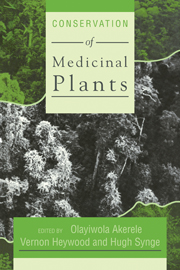Book contents
- Frontmatter
- Contents
- Contributors
- Preface
- Acknowledgements
- The Chiang Mai Declaration
- Introduction
- The Issue of Medicinal Plants
- Science, Industry and Medicinal Plants
- Techniques to Conserve Medicinal Plants
- Policies to Conserve Medicinal Plants
- Experiences from Programmes to Conserve Medicinal Plants
- 21 Medicinal Plants in India: Approaches to Exploitation and Conservation
- 22 The Chinese Approach to Medicinal Plants – Their Utilization and Conservation
- 23 Conservation of Medicinal Plants in Kenya
- 24 Complexity and Conservation of Medicinal Plants: Anthropological Cases from Peru and Indonesia
- 25 Utilization of Indigenous Medicinal Plants and their Conservation in Bangladesh
- 26 Development of a Conservation Policy on Commercially Exploited Medicinal Plants: A Case Study from Southern Africa
24 - Complexity and Conservation of Medicinal Plants: Anthropological Cases from Peru and Indonesia
Published online by Cambridge University Press: 07 September 2010
- Frontmatter
- Contents
- Contributors
- Preface
- Acknowledgements
- The Chiang Mai Declaration
- Introduction
- The Issue of Medicinal Plants
- Science, Industry and Medicinal Plants
- Techniques to Conserve Medicinal Plants
- Policies to Conserve Medicinal Plants
- Experiences from Programmes to Conserve Medicinal Plants
- 21 Medicinal Plants in India: Approaches to Exploitation and Conservation
- 22 The Chinese Approach to Medicinal Plants – Their Utilization and Conservation
- 23 Conservation of Medicinal Plants in Kenya
- 24 Complexity and Conservation of Medicinal Plants: Anthropological Cases from Peru and Indonesia
- 25 Utilization of Indigenous Medicinal Plants and their Conservation in Bangladesh
- 26 Development of a Conservation Policy on Commercially Exploited Medicinal Plants: A Case Study from Southern Africa
Summary
Introduction
The continued existence of many medicinal plants and of the knowledge of how to use them is threatened by two worldwide, inexorable processes: the rapid disappearance of tropical forests and other natural vegetation types, and the destruction or rapid change of tribal cultures and local medical traditions. While acknowledging the seriousness of these problems, in this paper we focus instead on some aspects of medicinal plant use that have received less attention. These are: the prevalence of users other than tribal people, the diversity of sources they exploit (including sources other than primary forests), and the varying effects of commercial exploitation on medicinal species. We briefly review the general problem before turning to specific cases.
Deforestation, especially of old growth or primary forests in the humid tropics, is endangering many medicinally useful plant species, although the precise number is not known. Species are threatened both by general destruction of their habitats and by overexploitation of particular products.
The rapidity with which medicinal plant knowledge is being lost is even more difficult to quantify. We cannot know what the destruction of native cultures, which often has entailed the actual physical destruction of entire groups, signifies in terms of knowledge lost. The erosion of medicinal traditions through progressive deculturation of tribal peoples is perhaps more significant world-wide. Increased reliance upon massmarketed chemical cures and abandonment of local medical traditions are occurring in many areas.
These processes of loss of plants and knowledge have been mentioned by many others concerned with the conservation of medicinal plants. While they are of enormous importance, we would like to add several refinements and cautions to these generally accepted views.
- Type
- Chapter
- Information
- Conservation of Medicinal Plants , pp. 321 - 328Publisher: Cambridge University PressPrint publication year: 1991
- 3
- Cited by



